Grumbles from the Grave (28 page)
Read Grumbles from the Grave Online
Authors: Robert A. Heinlein,Virginia Heinlein
Tags: #Authors; American - 20th century - Correspondence, #Correspondence, #Literary Collections, #Letters, #Heinlein; Robert A - Correspondence, #Science Fiction & Fantasy, #20th century, #Authors; American, #General, #Language Arts & Disciplines, #Science Fiction, #American, #Literary Criticism, #Science fiction - Authorship, #Biography & Autobiography, #Authorship

Dan manages to use a discredited time machine to return several months before the time he was shanghaied. He now invents the devices of Aladdin Corp. He gives his shares of Hired Girl to an eleven-year-old girl, Ricky, who has a crush on him, telling her how to meet him when she is grown; then he and his cat, Pete, take frozen sleep for thirty years.
His partner in Aladdin Corp is honest, and Dan is now a rich man. When Ricky is awakened from the long sleep, he meets her. They go off together to be married.
February 2, 1956: Robert A. Heinlein to Lurton Blassingame
I am 104 ms. pp. into a new novel, hopefully intended for the so-called adult trade. It is giving me chronic headaches and chronic insomnia and I wonder why I ever entered the silly business—but if I hold up physically,
The Door into Summer
should be finished in draft this month and finished in smooth around the end of March. Maybe.
We have a foot of snow on the ground, pheasants all over the place, and Pixie hates it. He blames Ginny.
May 31, 1956: Robert A. Heinlein to Lurton Blassingame
Re synopses for
Door into Summer
: I write my own synopses only when the editor twists my arm and demands it—which is usually. If Boucher [the editor of
The Magazine of Fantasy and Science Fiction
] is willing to do them himself, I'll be delighted; he's more literate than I am anyhow.
DOUBLE STAR
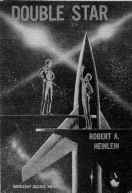
(167)
Heinlein had considered selling
Double Star
elsewhere, as he disapproved of Doubleday's Book Club contracts.
Lorenzo Smythe is an actor—a good one, though now down on his luck. When a spaceman named Broadbent offers him a job, he is willing—until he learns it is to go to Mars. But Broadbent forces him by a secret way through Skyport and to the
Go for Broke.
Then he learns that he is to impersonate the great statesman Bonforte—who has been kidnapped and who is due to deliver a major policy speech. Lorenzo is given tapes and films—and begins to "put on Bonaforte's head." But when Bonforte is found, he has been severely injured.
Lorenzo reluctantly carries on, meeting the press, entering a Martian "hive," even meeting Prince Willem, and learning more and more of Bonforte's manners and thoughts. Then Bonforte dies!
Broadbent and others finally persuade Lorenzo to carry on. He does, successfully for the rest of his life.
March 23, 1955: Robert A. Heinlein to Lurton Blassingame
I am aware that I should have written to you several days ago, but I trust you will forgive me when I say that I have completed the novel I was working on. Its present title is
Star Role
[
Double Star
], it runs about 55,000 words, and is intended for an adult audience. (No sexy scenes, however, and no taboo monosyllables—just an occasional damn or hell, and I may even take those out. The book should be suitable for the kids who will read it anyway.)
I held down the length in the belief that serial sale would be easier; I hope that this one will finally crack
Colliers
, the
Post
, or some other adult and not-SF-specialized market. I figure that, costs being what they are, a short length will make it more attractive for both trade book and pocket books as well.
* * *
I don't know whether you should advise Doubleday or not. I like [Walter] Bradbury but I do not like the screwy "Science Fiction Book Club" aspect of their contract; they sold a lot of copies of my books with them and I got very little out of it—I do not regard two and a half cents per copy as a good royalty on a hardcover edition put close on the heels of the trade book. Since Bradbury turned down the travel book, we are no longer under option to Doubleday; perhaps this would be a good time to look into the Ballantine deal if it is still being offered. In any case, I have an adult novel available for book and serial.
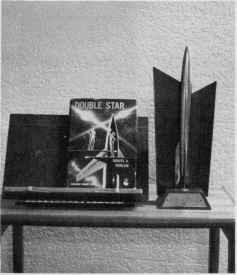
(168)
Double Star
went on to win the Hugo Award for Best Novel of 1956 at the World Science Fiction Convention, New York, NY.
April 21, 1955: Lurton Blassingame to Robert A. Heinlein
Congratulations on a good novel. Enjoyed all of
Double Star
; wished it longer. No slow spots.
June 3, 1955: Lurton Blassingame to Robert A. Heinlein
The
Post
thought your novel was excellent and the only reason they did not buy it as a serial was that they do not want to devote that much space to science fiction. Campbell is buying it, to run in February, March, and April issues. Doubleday to bring it out in March.
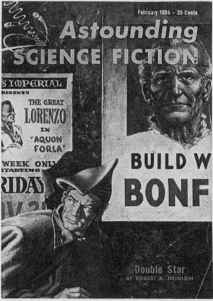
(169)
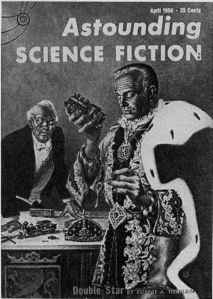
(169)
Heinlein had originally looked into a non-Science Fiction market for the serialized
Double Star
but eventually decided to publish in
Astounding
in three issues. Cover art by Kelly Freas.
GLORY ROAD
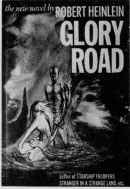
(170)
Glory Road
was a departure for Heinlein, being more fantasy than science fiction.
Oscar Gordon, a Vietnam veteran, is vacationing by the sea in the South of France when he is approached by a beautiful woman. She needs his help. He agrees, and she gives him a sword and takes him to another world, where many dangers beset them. He has to defeat dragons, an ogre, and other monsters. Betweentimes, they make love.
She tells him she is Ishtar, Queen of Twenty Universes, but she is powerless without the Phoenix Egg, which he must recover. They reach the place where it is and Oscar now faces a series of truly horrible dangers. But he recovers the Egg.
She makes him her Prince and takes him to Center, her world. But he grows bored with all the privileges and protocol. He learns how to return to Earth and leaves.
May 9, 1962: Robert A. Heinlein to Lurton Blassingame
I have not written for some time because I have been writing that new novel, now completed:
Glory Road
, 409 ms. pages, about 105,000 words. I am now revising it for my typist and will cut it a little but not much. You will have it not sooner than two months from now as my typist does my work as "moonlighting," as she has a daytime job. This is an adult market story with enough sex in it to give heart failure to those who complained about
Stranger.
It is fantasy verging on SF.
June 6, 1962: Robert A. Heinlein to Lurton Blassingame
. . . We intend to stay quietly at home all summer and I expect to spend the time hauling rocks and weeding and such. I do not expect to write until fall—after all, two novels in one year by the 1st of May is considerable copy, and I find I am tired and uninspired after finishing
Glory Road.
August 6, 1962: Lurton Blassingame to Robert A. Heinlein
Glory Road
is a departure, even for you. It is more fantasy than science fiction. It is an excellent adventure story, seasoned with sage thoughts, spiced with interesting sex. There were a number of spots where I wanted to stop reading and find an audience to share your ideas with. I do hope this will have a real success. I find it delightful.
September 30, 1962: Robert A. Heinlein to Lurton Blassingame
. . . I am not interested in his offer. Not the amount of the fee—a ms. is worth what you can get for it . . . sometimes zero. Nor do I object too much to the labor of cutting. What I do object to is that he wants me simply to chop off the last hundred pages.
If I do this, what is left is merely a sexed up fairy story, with no meaning and no explanations. I do not want this story published in such an amputated form. About thirty pages of that last hundred is indeed rather preachy, rather slow, and (if I were to cut) I would sweat that stretch down as much as possible—i.e., from the hero's arrival on the planet Center until his decision to leave—but I am quite unwilling simply to chop the story off at the point where they capture the Egg of the Phoenix. It leaves the story without meaning.
December 7, 1962: Lurton Blassingame to Robert A. Heinlein
Putnam likes
Glory Road.
There should be a little tightening in it, and "a few not very serious" suggestions for changes. Will mark ms. and send with detailed letter.
FARNHAM'S FREEHOLD
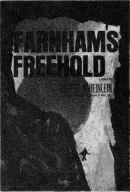
(172)
By 1964 and
Farnham's Freehold
, Heinlein was firmly entrenched with Putnam as his publisher.
